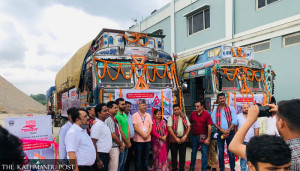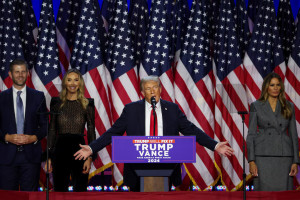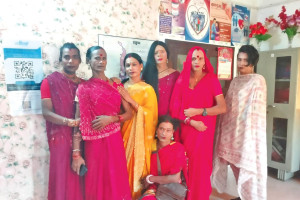Politics
RSP faces setbacks following chair Lamichhane’s arrest
The party has decided to change its form of protest as it announces a second-phase stir.
Purushottam Poudel
A series of events unfolding at least for the past eight months has pushed the Rastriya Swatantra Party (RSP) into a difficult situation, leaving the leaders of the two-year-old party confused.
The RSP leaders look more perplexed following the arrest of party president Rabi Lamichhane on the allegations of involvement in embezzling tens of millions of rupees from various cooperatives.
Police arrested Lamichhane, who is also a former deputy prime minister and home minister, from the party’s central office in Kathmandu on October 18 following an arrest warrant from the Kaski District Court.
After that district courts in Rupandehi, Kathmandu and Chitwan also issued arrest warrants against Lamichhane and others on charges of embezzling funds from the cooperatives. Lamichhane, among other individuals, is accused of embezzling deposits from Kathmandu-based Swarnalaxmi Cooperative, Pokhara-based Suryadarshan Cooperative, Butwal-based Supreme Cooperative and Bharatpur-based Sahara Chitwan Cooperative.
RSP announced protest programmes in Pokhara and Kathmandu on October 19, a day after Lamichhane's arrest, claiming that the party chief’s arrest was politically motivated.
The party also staged demonstrations in Bhairahawa when Lamichhane was taken in custody for interrogation for his involvement in misappropriating funds from the Supreme Cooperative based in Butwal.
However, the RSP, which has announced the second phase of its protest for November 23, has decided to change its strategy.
The party’s central committee meeting on Tuesday witnessed division among the central committee members over the modality of protest. Then the meeting on November 20 eventually decided to change the format for the second-phase protest.
“Few leaders at the central committee meeting argued that the second phase of protest should not be different from the first one,” a central committee member of the party told the Post on the condition of anonymity. “But, in view of the protest’s little public appeal, the party decided to change its form in the second phase.”
However, central committee member Hari Dhakal, who is also a lawmaker, refuted the claim. Dhakal argued that the party decided to change the protest format considering the by-election scheduled for December 1, in which the RSP has fielded its candidacy in 27 out of 44 seats up for grabs.
“This time, we plan to make the people aware of our agenda through the election campaign. Therefore, all the protests ahead are not street-centric,” Dhakal told the Post.
According to the party leaders privy to the developments, despite Dhakal's claim, some who spoke at the November 19 central committee meeting argued that the public was not interested in the agenda they pursued following Lamichhane’s arrest.
Dhakal agreed that the RSP often seemed confused while making a political decision after the party chair’s arrest. Lamichhane has so far not given any definite role to other leaders to oversee the party affairs in his absence.
“Naturally, a new party like ours will have a certain kind of dilemma in the absence of the main leader,” Dhakal added. “However, this does not mean that the political activities of our party have come to a standstill.”
In a country like Nepal, it is natural that parties are often individual-centric, and the RSP is not different, says a political analyst.
“In a leader-centric party, it is natural that the absence of central leadership often puts the party in a tight spot while taking major political decisions,” Chiranjibi Bhandari, a political analyst who is also an assistant professor at the central department of Conflict, Peace and Development Studies, told the Post.
Following its impressive performance in the 2022 general elections and the 2023 by-elections, many observers extrapolated a mighty electoral success for the RSP in the following years. In their reckoning, the party was expected to challenge the Nepali Congress and the UML, the two oldest and biggest players of Nepali politics, in the national elections due in 2027.
However, everything was not well with the party.
When the RSP candidate fared badly in the Ilam-2 by-election held in April, the party’s leaders drew up a conclusion that something had gone wrong with the party organisation. Then, the RSP entrusted then-party general secretary Mukul Dhakal with touring various parts of the country and studying the matter.
Dhakal, the party's founding general secretary, visited 38 districts and submitted a review report to the party committee. As Dhakal also leaked the report to the media it caused a storm within the party as his finding chiefly blamed chair Lamichhane for the party’s diminishing image in the public.
The report resulted in Dhakal's expulsion from the party.
The problem deepened when the parliamentary special committee formed to investigate the crisis-ridden cooperatives implicated the party’s chair in a case of cooperatives funds misuse. While the party rank and file vehemently denied the claim, Lamichhane’s arrest came as a big blow to the RSP.
Some current indications are certainly not encouraging for RSP leaders. The party reportedly found no candidate for the Kirtipur mayoral election scheduled for December 1.
The Ilam and Kirtipur episodes suggest that the RSP has failed to expand its command down to the grassroots, experts say.
Senior vice-president of RSP, DP Aryal acknowledged that his party failed to find an appropriate candidate in Kirtipur Municipality, which could be normal for any other party.
“We were looking for a candidate who could carry the values and principles of our party,” Aryal told the Post. “After not finding an appropriate candidate in Kirtipur Municipality, we took a decision to not field anyone who could not champion the principles and values of our party.”
The RSP sent a chilling message to the major traditional forces when it emerged the fourth largest party in the November 2022 election, just six months after its establishment. In the 2023 by-elections, it gained one more seat.
However, within two years, the party was in a position to change its protest format, claiming it was failing to attract public support.
Does this signal the party is in serious trouble?
“New political parties like the RSP got traction due to the public disenchantment towards the traditional political parties, not because of their own political agenda,” said Bhandari. “The party has yet to prove itself in the public eye.”
Political analyst Bhandari further added that they might have switched the protest format after the earlier one did not work. “It, however, would be too early to call it a downfall of the party,” he added.
“The party is indeed in a dilemma after Lamichhane’s arrest. However, shifting the protest strategy cannot be termed otherwise,” Bhandari said.




 19.12°C Kathmandu
19.12°C Kathmandu















